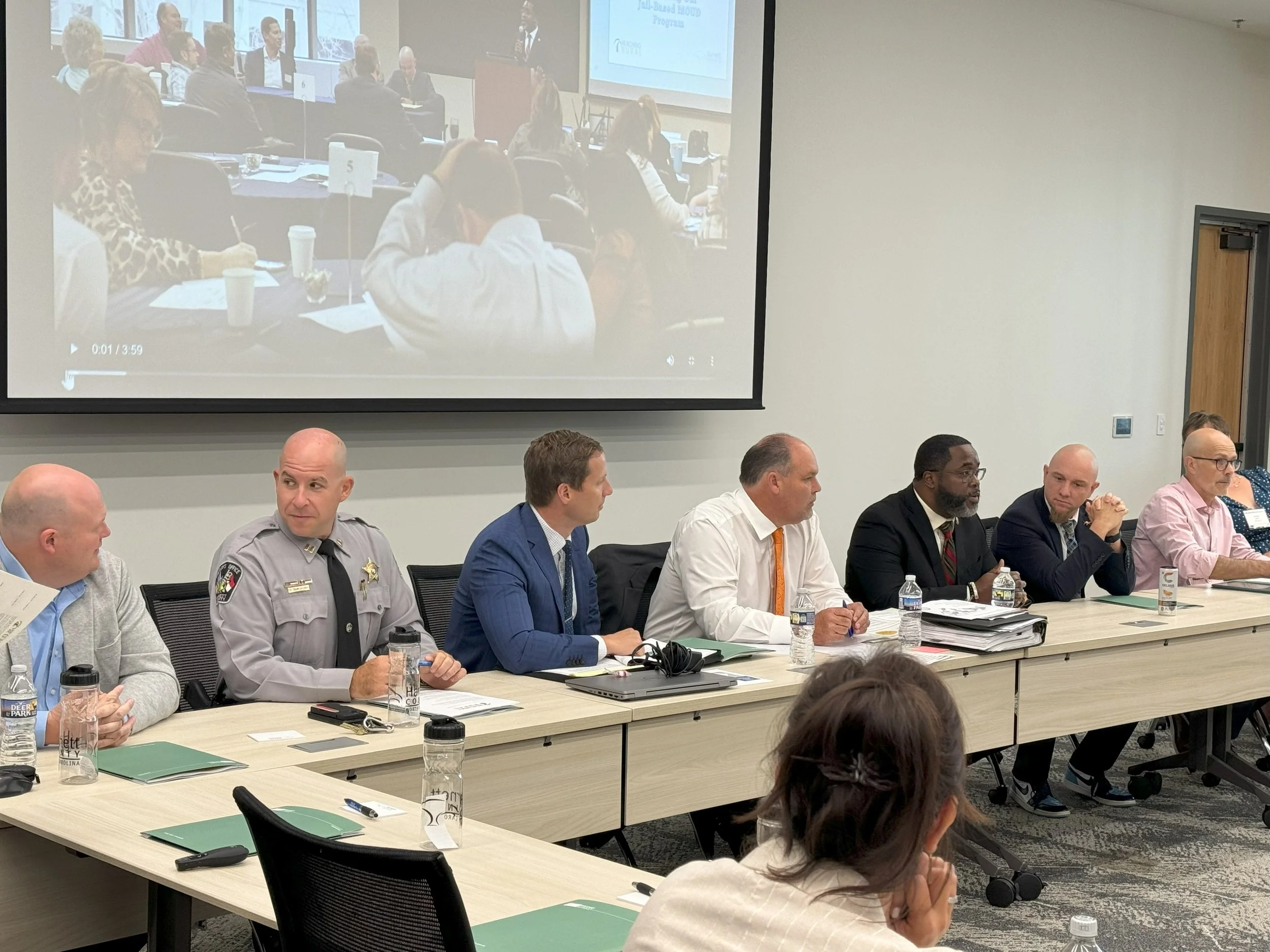Resources for Rural Communities
Use the filters below to search by resource topic, type, and audience.
Leveraging Telehealth for Justice-involved Populations With Substance Use Disorders: Lessons Learned and Considerations for Governors
This brief reviews activities undertaken by states to expand the use of telehealth for justice-involved individuals with SUDs during the COVID-19 pandemic, share lessons learned, and highlight considerations for governors who wish to leverage telehealth services to increase access to SUD treatment for those involved in the justice system.
988 Implementation in Rural Communities
Article explores challenges and strategies for implementing the 988 crisis line in rural areas, including Alabama and Mississippi, to improve mental health crisis response.
Arts Help Rural Cities Creatively Support Community Mental Health
Rural cities use arts and civic engagement to address mental health, raise awareness, and foster creative solutions to local challenges.
Planning Principles Toolkit
The Principles for the Use of Funds From the Opioid Litigation are nationally recognized guidance for states, counties and cities receiving money from the lawsuits against entities that contributed to the opioid epidemic. Coordinated by faculty at the Johns Hopkins Bloomberg School of Public Health (Johns Hopkins), the Principles are designed to help governments of all levels lay the foundation to effectively invest opioid settlement funds to save lives from overdose.
Overdose Fatality Review: A Rural Community Approach
A suicide/overdose fatality review (S/OFR) can impact community change and policies. Having the right participants at the S/OFR is critical to positive community engagement. Bringing together cross-sectors of a rural community to create change can bring remarkable success and significant challenges! Protecting our children and future community leaders is a great reason to work toward a solution and put bias aside. In 2019, the Jay County, Indiana, community developed an S/OFR. In 2020, it reviewed its first decedent.
Treatment and Recovery for Pregnant and Parenting People: A NACo Opioid Solutions Strategy Brief
Brief recommends expanding MOUD access for pregnant/parenting people in rural areas, using telehealth, mobile clinics, and family-centered approaches to keep families together.
Mental Health First Aid for Rural Communities
Mental Health First Aid for Rural Communities teaches people how to notice and respond to signs of mental health and addiction challenges with a specific focus on the cultural and environmental factors related to life in rural areas. Mental Health First Aid is a course that teaches you how to identify, understand and respond to signs of mental illnesses and substance use disorders. The training gives you the skills you need to reach out and provide initial help and support to someone who may be developing a mental health or substance use problem or experiencing a crisis.
Primer On Spending Funds from The Opioid Litigation: A Guide for State and Local Decision Makers
Want to know how jurisdictions should prioritize programs for funding from the opioid litigation? This Primer on Spending Funds from the Opioid Litigation provides background information on each of the nine core abatement strategies including considerations for funding and implementation.
A Guide to Funding Resources: The Rural Information Center
The “Funding Resources” section of A Guide to Funding Resources includes links to searchable databases offering funding opportunities from government and/or private sources available to local governments, community organizations, and individuals. It provides links to full text online guides and tips to assist grant writers prepare successful proposals. The reader may locate links to additional funding programs and information on the Rural Information Center (RIC) website.
Mobile Treatment for Opioid Use Disorder: Examples From the Field—Part III
The goal of this series is to inform jurisdictions considering whether a mobile treatment program would work in their communities and to determine what type of model would fit best. This article closes the series with some general takeaways and suggestions for law enforcement and public safety professionals who are interested in collaborating with a mobile treatment program in their community.
Successful Strategies for Addressing the Opioid Epidemic in Rural Communities: Youth & Families Prevention & Intervention
Rural communities across the country are identifying ways to effectively implement youth- and family-focused programs to better serve individuals directly affected by SUD. This brief is one in a series highlighting projects that are part of the Rural Responses to the Opioid Epidemic (RROE) project.
Successful Strategies for Addressing the Opioid Epidemic in Rural Communities: Transportation
Rural communities across the country are implementing solutions to these transportation challenges to better serve residents with SUD and make more efficient use of limited resources. This brief is one in a series highlighting projects that are part of the Rural Responses to the Opioid Epidemic (RROE) project.
Successful Strategies for Addressing the Opioid Epidemic in Rural Communities: Response Teams
Rural communities across the country are coming up with innovative ways to respond to overdose spikes in their communities through community outreach and response teams, which make contact with individuals and families who have experienced overdose to offer support and connections to services and treatment. This brief is one in a series highlighting projects that are part of the Rural Responses to the Opioid Epidemic (RROE) project.
Successful Strategies for Addressing the Opioid Epidemic in Rural Communities: Law Enforcement- and First Responder-Led Diversion Programs
Communities all over the country are implementing law enforcement- and first responder-led diversion efforts to redirect individuals with SUD, mental health disorders, and co-occurring disorders away from jail and the criminal justice system and into the care of community-based treatment programs. This brief is one in a series highlighting projects that are part of the Rural Responses to the Opioid Epidemic (RROE) project.
Successful Strategies for Addressing the Opioid Epidemic in Rural Communities: Jail-Based Programming
To combat the rising numbers of individuals with SUD, jails across the country have begun implementing jail-based programming to help incarcerated individuals as they seek recovery, reduce recidivism, and reduce the chances of overdose upon release. This brief is one in a series highlighting projects that are part of the Rural Responses to the Opioid Epidemic (RROE) project.
Successful Strategies for Addressing the Opioid Epidemic in Rural Communities: Harm Reduction
Rural communities across the country are implementing harm-reduction programs to better serve residents with substance use disorder (SUD) and make more efficient use of limited resources. This brief is one in a series highlighting projects that are part of the Rural Responses to the Opioid Epidemic (RROE) project.
Successful Strategies for Addressing the Opioid Epidemic in Rural Communities: Engaging With Faith-Based Organizations
Rural communities in all areas of the country are reaching out to their churches and faith-based organizations to bring them on as important partners and expand upon their outreach initiatives, as well as utilize the built-in resources many churches have, such as food pantries, clothing drives, and childcare services. This brief is one in a series highlighting projects that are part of the Rural Responses to the Opioid Epidemic (RROE) project.
Successful Strategies for Addressing the Opioid Epidemic in Rural Communities: Engaging the Local Business Community
Rural communities across the country are identifying ways to effectively partner with their local business community to better serve residents with substance use disorder (SUD) and make more efficient use of limited resources. This brief is one in a series highlighting projects that are part of the Rural Responses to the Opioid Epidemic (RROE) project.
Tailoring Crisis Response and Pre-arrest Diversion Models for Rural Communities
This action brief provides rural communities recommended strategies for adapting promising or proven interventions to better support crisis response and pre-arrest diversion in their communities. It is the first of three briefs developed from the Substance Abuse and Mental Health Services Administration (SAMHSA) Prearrest Diversion Expert Panel.
Evidence-Based Crime Reduction Strategies for Small, Rural, and Tribal Agencies
This guide provides evidence-based policing practices (EBPP) for small, rural, and tribal agencies. The information comes from published research studies and working group conversations with command staff from various small, rural, and tribal agencies
Mobile Treatment for Opioid Use Disorder: Examples From the Field—Part II
The goal of this series is to inform jurisdictions considering whether a mobile treatment program would work in their communities and to determine what type of model would fit best. The first program in this article is the Eastern Shore Mobile Care Collaborative (ESMCC) at Caroline County Health Department in Maryland. The second is the Mobile Health Services program implemented by the Colorado Department of Human Services, Office of Behavioral Health (OBH).
Domestic Violence in Rural Communities
Rural communities face unique challenges in responding to incidences of domestic violence, due to geographic isolation and a lack of resources, among other factors. Such challenges make it difficult for survivors in rural areas to seek safety. These 10 practices for criminal courts in rural communities offer strategies to protect survivors’ safety and well-being, engage with abusive partners and hold them accountable, and collaborate within the community.
Resource Guide for Rural Workforce Development
This guide was created for community leaders and other local entities to help them access resources to create jobs, train talent, expand educational opportunities and provide technical assistance. The guide outlines programs and services available at USDA and other federal departments and agencies that support workforce development in rural communities. Included is a rural workforce resource guide matrix and a comprehensive list of other federal and federally supported programs, including the Reentry Employment Opportunities (REO) program.
Mobile Treatment for Opioid Use Disorder: Examples From the Field—Part I
The goal of this series is to inform jurisdictions considering whether a mobile treatment program would work in their communities and to determine what type of model would fit best. The two mobile models featured in this article are an induction-only program that prescribes Suboxone (buprenorphine/naloxone) and a methadone delivery program that was created because of the COVID-19 public health emergency.
Opioids in Appalachia: The Role of Counties in Reversing a Regional Epidemic
Communities nationwide are grappling with a growing opioid crisis, particularly in the Appalachian region, where overdose death rates were 72% higher in 2017 than in non-Appalachian areas. Local leaders have struggled to address rising addiction and overdoses, prompting this report to analyze the epidemic's impact and offer targeted recommendations in five areas: leadership, prevention, recovery, rehabilitation for justice-involved individuals, and economic development, each supported by case studies from Appalachian counties.
Promising Strategies in Providing Opioid Use Disorder Treatment to Rural, Frontier, and other Underserved Communities
Information on barriers to treatment for Opioid Use Disorder in rural areas and what some states are doing to overcome those barriers.
Federal Resources for Rural Communities to Help Address Substance Use Disorder and Opioid Misuse
ONDCP has identified 26 overarching categories to organize this resource guide and help users identify potential sources of assistance for issues they find most challenging. This list is not exhaustive: many of the programs and resources listed in these pages cover a much broader range of potential uses.
Tribal State Court Forums: Addressing the Opioid Crisis
Collaboration between state and tribal courts regarding the opioid crisis.
Tribal Cultural Competency Information for Judges
Information on barriers to treatment for Opioid Use Disorder in rural areas and what some states are doing to overcome those barriers.
Sample Court Transfer Agreement - State and Tribal Courts
Document designed and recommended for use in jurisdictions where state court judges – especially those who preside over adult drug court programs – operate in proximity to the location of a Tribal Healing to Wellness Court.
How Can USDA Help Address the Opioid Epidemic?
This infographic visually displays the tools that USDA Rural Development can offer to help rural America respond to the opioid epidemic.




















